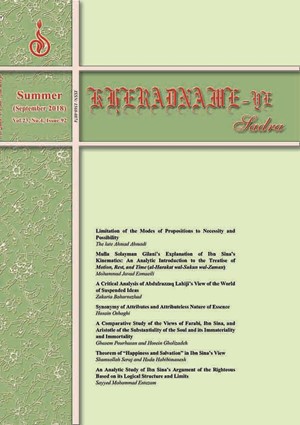A Comparative Study of the Views of Farabi, Ibn Sina, and Aristotle of the Substantiality of the Soul and its Immateriality and Immortality
Subject Areas : مطالعات تطبیقی فلسفههای اشراقی
Qasim Pourhassan
1
*
![]() ,
Hosein Gholizadeh
2
,
Hosein Gholizadeh
2
1 - علامه طباطبائي
2 - Allameh Tabataba’I University
Keywords: Substance soul immateriality immortality Aristotle Farabi Ibn Sina ,
Abstract :
Aristotle believes that the soul is necessarily a substance and views substance as the main ontological concept of his philosophy. Accordingly, it is important to learn about his idea of substance in order to perceive his view of the materiality or immateriality of the soul. Aristotle received great attention in the tradition of Islamic philosophy, particularly, the Peripatetic philosophy, and the stance of Islamic thinkers with regard to the soul bears some direct or close relationship with his theories. Farabi and Ibn Sina agree with Aristotle’s different definitions of substance and its general division into sensible and insensible types. However, the fundamental differences between their ideas and those of this Greek philosopher have yielded certain consequences which are quite noteworthy. The main purpose of this study is to explore such differences and discover their ultimate views on the immateriality and immortality of the soul. Accordingly, the writers initially examine the words that Aristotle used in order to define the meaning of substance and, secondly, refer to the various works in which he discussed the concept of substance. Finally, they compare his ideas in this regard with those of Farabi and Ibn Sina.
ابن رشد، تلخيص كتاب مقولات، قاهره، الهيئة المصريه، 1980م.
ابنسينا، التعليقات، تحقيق عبدالرحمن بدوي، قم، مكتب الاعلام الاسلامي، 1404ق.
ابنسينا، النفس من كتاب شفاء، تحقيق آيت الله حسنزاده، قم، بوستان كتاب، 1392.
ابنسينا، رسائل ابنسينا، قم، بيدار،1400ق.
ارسطو، ارگانون، ترجمه ميرشمس الدين اديب سلطاني، نگاه، 1378.
ارسطو، دربارة نفس، ترجمه عليمراد داودي، تهران، حكمت، 1369.
ارسطو، متافيزيك، ترجمه شرف الدين خراساني، تهران، حكمت،1379.
افلاطون، مجموعة آثار، ترجمة محمد حسن لطفي و رضا كاوياني، تهران، حكمت،1379.
پورحسن، قاسم؛ منصوري، محسن، «ابنسينا و مسئله جاودانگي نفس»، تاريخ فلسفه، ش14،1392.
خوانساري محمد، ايساغوجي و مقولات، تهران، مركز نشر دانشگاهي، 1383.
ذكياني، غلامرضا، «در آمدي بر فلسفه منطق ارسطو»، حكمت و فلسفه، سال چهارم، شماره سوم، 1387.
فارابي، الحروف، بيروت، دارالمشرق، 1986م.
فارابي، رسالتانفلسفيتان، ج1، بضميمة كتابالتنبيه عليسبيلالسعاده، جعفر آلياسين، تهران، 1371.
كاپلستون، فرديك، تاريخ فلسفه، ج4، تهران، سروش، علمي و فرهنگي، 1380. ملاصدرا، الحكمة المتعاليه في الأسفار الأربعة، ج8، تصحيح و تحقيق علي اكبر رشاد، تهران، بنياد حكمت اسلامي صدرا، 1383.
هالينگ ديل، ر.ج، تاريخ فلسفه غرب، ترجمه عبدالحسين آذرنگ، تهران، ققنوس، 1381.
Aristotle,Gategorise, in a new Aristotle reader, translated by J. L. AcKrill, Oxford University Press, P992, 2a11-14,1987.
Lowe, EJ, Introduction to substance, in philosophical studies, edited by Steven D. Hales, Bloomsburg university, Wads Worth publishing company, 1996.

